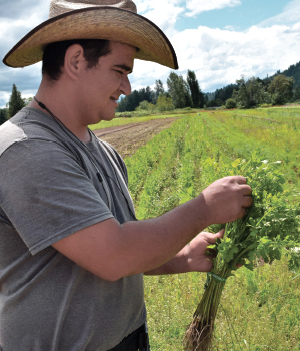Conserving farmland for greater impact
by Molly Goren, PCC Farmland Trust
This article was originally published in November 2016

It started with one farm, a farm you’ve probably heard of: Nash’s Organic Produce. Thanks to the PCC community’s support in 1999, Nash continued farming, and PCC Farmland Trust was born. Since then, the Farmland Trust has protected almost 1,700 acres of sustainable and organic farmland across Washington.
Mostly, we did it the traditional way. Guided by technical mapping, our staff knocked on doors in communities with highly valuable, highly threatened farmland. We worked on a farm-by-farm basis, removing a farm’s development potential, protecting both the land’s natural resources and the livelihoods of the farmers who cared for it.
For nearly two decades, this approach worked — we’ve revitalized historic farming communities in places like the Puyallup Valley, and have forged new pathways for families to stay on the farm. But after many frank conversations with farmers over recent years, we realized we needed to do more than just buy development rights to make a difference. We needed to show up for farmers in a new way, making land more accessible and incentivizing good farming practices. We needed to take risks to seek out vulnerable farms with great potential — even if that meant looking beyond their current condition.
Thinking bigger: a farmland success story
In 2010, when we learned of a prized 120-acre piece of land for sale in Pierce County, we saw an opportunity. Although it wasn’t in organic production at the time, we knew we couldn’t sit by and watch the farm sell to the highest bidder — especially in an area that has lost more than 70 percent of its farmland since 1950. So we got creative, secured funding, collaborated with the county, and purchased the farm outright.
While we searched for the right farmer to work the land, we cared for it ourselves. It was a tireless process. Over three years, our entire staff, plus 200 volunteers, came out to work. You might have been one of them! Together, we improved the land’s fertility, repaired the barn and the well, restored 66,000 square feet of streamside habitat, and planted hundreds of native plants to attract pollinator species.
Today, we have a hard-working, passionate farm family in place caring for the land under the name Four Elements Farm, and we couldn’t be more thrilled. Amy Moreno-Sills and her husband Agustin have more than 15 years of commercial farming experience. Today, Four Elements grows certified organic blueberries, available for U-Pick in the summer months, and a wide variety of organic vegetables.
Sustaining farmland for the long haul
In addition to transitioning the farm to organic production, Amy and Agustin implement sustainable farming practices to help their land thrive into the future. They work hard to build soil health using organic soil amendments, cover crops and crop rotations to increase the land’s productivity for the long haul. Amy and Agustin are able to implement these practices in part because of PCC Farmland Trust’s pilot micro-grant program, Advancing Farm Sustainability (AFS), of which they are beneficiaries. AFS grants are awarded to PCC Farmland Trust farmers to incentivize projects that improve water quality, soil quality or habitat on farms.
This approach not only amplifies the call for good farming practices, but it also actively enables farmers to move the needle toward increased ecological resilience of their protected land.
Scaling up, securing our future
Seeing the potential in a parcel of farmland requires foresight, commitment and deep relationships with sustainable and organic food producers. The story of Four Elements Farm reminds us that taking risks and investing in farmland, even in a vulnerable condition, pays off. Amy and Agustin’s commitment and passion inspire us to support farms and farmers at every stage.
We plan to protect more land using this fresh thinking as our guide — and we’ve already started. Most notably, PCC Farmland Trust will purchase Mountain View Dairy in Graham, Wash., by the end of this year. Surrounded by fragmented farmland, the property is at high risk for residential conversion and has some of the best remaining soils in the area. It was platted for 59 lots at one point.
At 284 acres, Mountain View Dairy is eight times larger than its neighbors and will be the largest farmland conservation project to date in Pierce County. The best part is, there are already wonderful tenants — Organic Valley farmers based in Enumclaw — ready to farm it.
PCC Farmland Trust plans to protect dozens more farms in the years ahead that will allow for the expansion of commercially viable farm businesses in threatened agricultural communities, or facilitate the succession of a historic farm to a young, passionate farm family.
Follow along at pccfarmlandtrust.org for more food and farm wins in the months ahead.
Molly Goren is the Communications Manager at PCC Farmland Trust.
